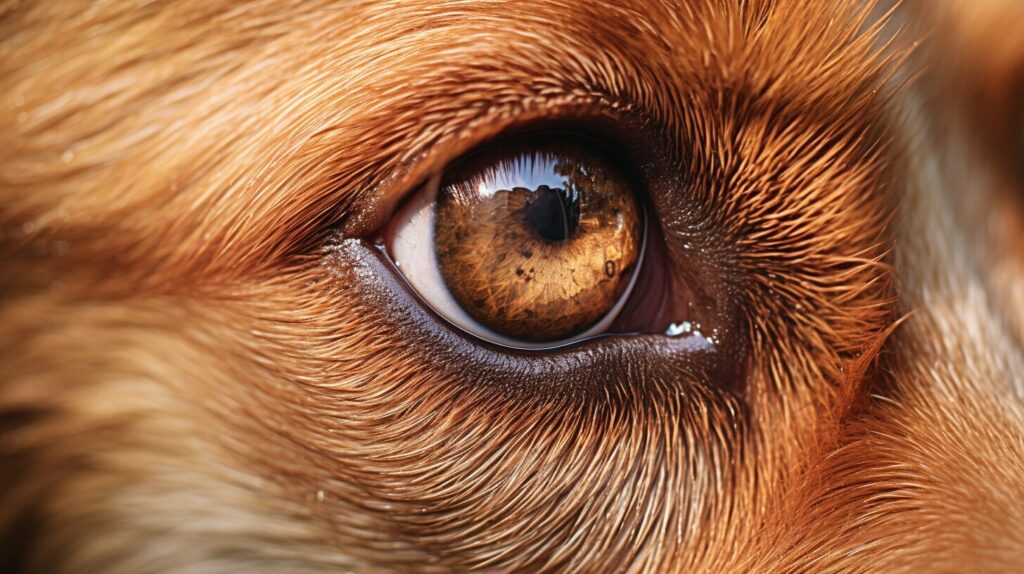If you notice that your furry friend’s eyeball is swollen, it could be a sign of a serious health issue. As a pet owner, it’s crucial to understand the possible causes and treatment options for a swollen eyeball in dogs. In this article, we’ll explore the common causes of dog eye swelling, how to identify the symptoms, and offer practical solutions for treating the condition.
Key Takeaways:
- A swollen eyeball in dogs can be a sign of a severe health issue.
- Identifying the symptoms of a swollen eyeball is crucial in determining whether your dog needs veterinary help.
- Common causes of a swollen eyeball in dogs include eye infections, injuries, and underlying health conditions.
- You can provide immediate first aid measures to alleviate the discomfort of a swollen eyeball in dogs.
- Preventing eye problems in dogs is possible through proper eye care and regular vet check-ups.
Understanding Canine Eye Inflammation
If you notice your dog’s eyeball is swollen, it may be due to canine eye inflammation. This condition can be caused by various dog eye problems, including infections, allergies, and foreign objects in the eye.
Canine eye inflammation typically affects one or both eyes and may present as redness, watering, and discharge. Your dog may also display signs of discomfort, such as pawing at their eye or rubbing their face against objects.
Types of Canine Eye Inflammation
There are several types of canine eye inflammation, each with different causes and symptoms:
| Type of Inflammation | Cause | Symptoms |
|---|---|---|
| Conjunctivitis | Bacterial infections, allergies, irritants | Redness, swelling, discharge |
| Keratitis | Corneal injury, infection, dry eye | Cloudy or opaque cornea, redness, discharge |
| Uveitis | Infection, autoimmune disease | Redness, sensitivity to light, cloudiness, decreased vision |
If you suspect your dog may have canine eye inflammation, it’s important to seek veterinary care. Your veterinarian can diagnose the underlying cause and prescribe appropriate treatment, which may include medications such as eye drops or antibiotics.
It’s also crucial to maintain good eye hygiene for your dog by cleaning their eyes regularly and removing any debris or discharge. This can prevent or reduce the severity of eye inflammation and other dog eye problems.
Identifying Symptoms of a Swollen Eyeball in Dogs
If you suspect your dog has a swollen eyeball, it is important to identify the symptoms to determine the best course of action. Some common signs of eye problems in dogs include:
- Redness or irritation around the eye
- Watery or cloudy eyes
- Squinting or blinking excessively
- Discharge or pus coming from the eye
- Changes in the size or shape of the eye
- Bumping into things or difficulty seeing
It is important to note that not all eye problems in dogs are accompanied by swelling, so it is crucial to monitor your pet’s behavior and look for any changes in their eyes.
If you notice any of the symptoms mentioned above or suspect your dog is experiencing any eye problems, it is best to seek veterinary care immediately. Early detection and treatment of eye issues can help prevent further complications and potential vision loss.
Common Causes of Swollen Eyeball in Dogs
There are several possible causes of a swollen eyeball in dogs, including various eye infections and other health issues that can lead to eye problems. Understanding the underlying cause of your dog’s swollen eyeball can help determine the appropriate treatment and prevent future eye problems. Below are some of the common causes of eye problems in dogs:
| Cause of Swollen Eye | Symptoms |
|---|---|
| Dog Eye Infection | Redness, discharge, squinting, and excessive tearing |
| Corneal Ulcer | Cloudy eye, redness, pawing at the eye, and sensitivity to light |
| Glaucoma | Bulging eye, redness, squinting, and vision loss |
| Foreign Object in the Eye | Squinting, pawing at the eye, excessive tearing, and redness |
| Conjunctivitis | Redness, discharge, swelling, and itching |
| Cataracts | Cloudy or bluish-white eye, vision loss, and bumping into things |
If your dog’s swollen eyeball is accompanied by other symptoms, such as pain, discharge, or vision loss, it is important to seek veterinary assistance promptly. Your veterinarian can perform a thorough examination and determine the underlying cause of the eye problem. Timely treatment can help prevent further complications and ensure your dog recovers fully.
Treating Swollen Eye in Dogs
When you notice your dog’s eyeball is swollen, it’s crucial to take prompt action to relieve their discomfort and prevent any potential complications. Here are some remedies and treatments you can use:
1. Eye Rinse
You can clean your dog’s eye by rinsing it gently with a saline solution. The solution helps to get rid of any debris and dirt that may be causing irritation, leading to a swollen eyeball. To prepare this solution, mix a ¼ teaspoon of salt in a cup of warm water and fill a dropper with the mixture. Gently lift your dog’s eyelid and place a few drops in the eye, then gently massage the eyelid to distribute the solution.
2. Cold Compression
Applying a cold compress can help reduce swelling and ease any discomfort. To make a cold compress, wrap ice or frozen vegetables in a towel and place it against the affected eye for five minutes. Repeat every two hours for the first day to reduce the swelling.
3. Artificial Tears
If the swollen eye is due to allergies or dryness, using artificial tears can help soothe the irritation. These over-the-counter eye drops lubricate the eye and help relieve any discomfort. However, it’s important to consult a veterinarian before administering any medication to your dog.
4. Seek Veterinary Help
If the swelling doesn’t go down after a few hours, or you notice any other symptoms such as discharge or redness, it’s best to seek veterinary attention immediately. Your vet can examine your dog’s eye and determine the underlying cause of the swelling and provide appropriate treatment.
Remember, prevention is always better than cure. Regularly cleaning your dog’s eyes and practicing good hygiene can help prevent eye problems that can lead to a swollen eyeball. If you notice any unusual signs or symptoms, always seek professional help to ensure your furry friend’s health and wellbeing.
Tips for Dog Eye Health Maintenance
Preventing eye problems in dogs is key to avoiding a swollen eyeball and other health issues related to canine ophthalmology. Here are some tips to maintain your dog’s eye health:
- Regular vet visits: Take your dog for regular check-ups with a veterinarian to detect and address any potential eye problems early on.
- Cleanliness: Keep your dog’s eyes clean by gently wiping away any discharge or dirt with a damp cloth or eye wipes.
- Proper nutrition: Feed your dog a balanced diet with adequate amounts of vitamins A, C, and E, which are essential for eye health.
- Sun protection: Protect your dog’s eyes from harmful ultraviolet rays when spending time outdoors by using dog sunglasses or keeping them in the shade.
- Avoid irritants: Keep irritants like smoke, dust, and chemicals away from your dog’s eyes, as they can cause irritation and lead to eye problems.
- Genetic testing: If you plan to breed your dog, consider genetic testing for any potential eye-related health issues to help prevent them in future generations.
With proper care and attention, you can help maintain your dog’s eye health and reduce the risk of a swollen eyeball and other eye problems.
When to See a Veterinarian
While home remedies and first aid techniques can be helpful for alleviating a swollen eyeball in dogs, it is essential to know when it is time to seek professional help from a veterinarian.
If your dog’s eye problem persists for more than a day or two, this is a clear sign that the issue is not resolving on its own and requires veterinary attention. Additionally, if the eyeball appears to be bulging or protruding from the eye socket, this is a medical emergency, and you should contact a veterinarian immediately.
If your dog is experiencing other symptoms in addition to a swollen eyeball, such as excessive tearing, discharge, or redness, this could be a sign of a more severe underlying condition. In this case, scheduling an appointment with a veterinarian as soon as possible is crucial for your pet’s health and well-being.
Canine ophthalmology is a specialized field that requires advanced training and expertise. Veterinarians who specialize in this area can accurately diagnose and treat a wide range of eye problems in dogs. They may perform specialized tests or procedures to determine the underlying cause of your dog’s swollen eyeball and provide appropriate treatment.
Remember, your dog’s eyes are essential for their overall health and well-being. If you suspect that your dog is experiencing any eye problems, it is always best to err on the side of caution and seek veterinary attention promptly.
Home Remedies and First Aid for Swollen Dog Eyeball
If you suspect your dog has a swollen eyeball, there are some home remedies and first aid measures you can try before seeking veterinary assistance. These remedies can help alleviate the discomfort and reduce swelling.
Flush the Eye
If you suspect that something may have irritated your dog’s eye, you can try flushing it with a saline solution. You can make this by dissolving a teaspoon of salt in a cup of boiled water, then cooling it down until it is lukewarm. Use a clean cup and a syringe or dropper to gently flush your dog’s eye with the solution. Do this two to three times a day for several days until the swelling subsides.
Cool Compress
You can also try applying a cool compress to the affected eye. Wet a clean cloth with cold water and hold it gently against your dog’s eye for a few minutes. Alternatively, you can use a cold pack wrapped in a towel. Repeat this several times a day for 10-15 minutes at a time. This can help reduce inflammation and ease discomfort.
Keep the Area Clean
Make sure the affected area around your dog’s eye is kept clean to avoid any further infection. You may use a clean, damp cloth to wipe around the eye gently. Avoid using any harsh soaps or chemicals in the area of the eye as this can cause further irritation.
Seek Professional Help When Necessary
If your dog’s swollen eyeball persists or gets worse after a few days, you should seek professional veterinary help. The vet can assess the severity of the swelling and determine if your dog has an underlying condition that needs treatment. It’s essential to take prompt action to prevent any further discomfort or damage to your dog’s eye.
Tips for Dog Eye Health Maintenance
Preventing eye problems should be a priority for every dog owner. Here are some tips to help maintain good eye health in your furry friend:
- Regular eye examinations: It is important to schedule annual check-ups with your veterinarian to detect any underlying eye problems early on.
- Keep the eyes clean: Wipe your dog’s eyes with a clean, damp cloth to remove any dirt or debris that may cause irritation or infection.
- Avoid direct sunlight: Too much exposure to the sun’s UV rays can lead to eye damage and even blindness. Keep your dog indoors during the hottest times of the day or invest in dog sunglasses.
- Opt for quality dog food: A balanced and nutrient-rich diet is essential for maintaining good overall health, including eye health.
- Provide enough hydration: Make sure your dog has access to fresh water at all times, which helps maintain healthy tear production and prevents dry eyes.
- Check for signs of allergies: Allergies can cause eye irritation, redness, and swelling. Consult with your veterinarian if you notice any allergic symptoms in your dog.
By following these tips, you can ensure that your furry friend maintains healthy eyes for years to come.
Conclusion
As a responsible pet owner, it is vital to keep an eye out for any signs of eye problems in your beloved dog. A swollen eyeball can be caused by various factors, including infections, allergies, injuries, and underlying health conditions.
If you notice any symptoms such as redness, swelling, discharge, or discomfort, it is crucial to seek veterinary attention immediately. Delaying treatment can lead to more severe eye problems that can affect your dog’s vision and overall well-being.
Fortunately, there are various remedies and first aid measures that you can administer at home to alleviate your dog’s swollen eyeball, including eye drops, cold compresses, and gentle cleaning. In addition, practicing good eye health maintenance can go a long way in preventing eye problems in dogs, such as regular eye check-ups and proper hygiene.
In summary
If you suspect that your dog’s eyeball is swollen or experiencing any eye problems, do not hesitate to seek professional veterinary help. Prompt and proper treatment can prevent severe complications and alleviate your dog’s discomfort. Remember to practice good eye health maintenance and keep an eye out for any signs of eye problems to ensure your dog’s continued health and happiness.
FAQ
Q: Can a swollen eyeball in dogs be serious?
A: Yes, a swollen eyeball in dogs can be a sign of a more serious underlying problem. It is important to have your dog examined by a veterinarian to determine the cause and appropriate treatment.
Q: What are the common causes of a swollen eyeball in dogs?
A: Common causes of a swollen eyeball in dogs include eye infections, allergies, foreign objects in the eye, trauma, and underlying health conditions.
Q: How can I tell if my dog’s eyeball is swollen?
A: Look for symptoms such as redness, excessive tearing, discharge, squinting, pawing at the eye, or changes in behavior. If you suspect your dog’s eyeball is swollen, it is recommended to seek veterinary care.
Q: Can I treat a swollen eye in my dog at home?
A: It is best to consult with a veterinarian before attempting any home treatment. Depending on the cause, your veterinarian may recommend specific remedies or prescribe medication.
Q: When should I see a veterinarian for my dog’s swollen eyeball?
A: You should see a veterinarian if your dog’s eye does not improve within 24-48 hours, if there is excessive swelling or pain, or if your dog’s vision is affected.
Q: How can I prevent eye problems in my dog?
A: Regularly clean your dog’s eyes, avoid exposing them to irritants or foreign objects, and schedule routine veterinary check-ups to monitor their eye health.



